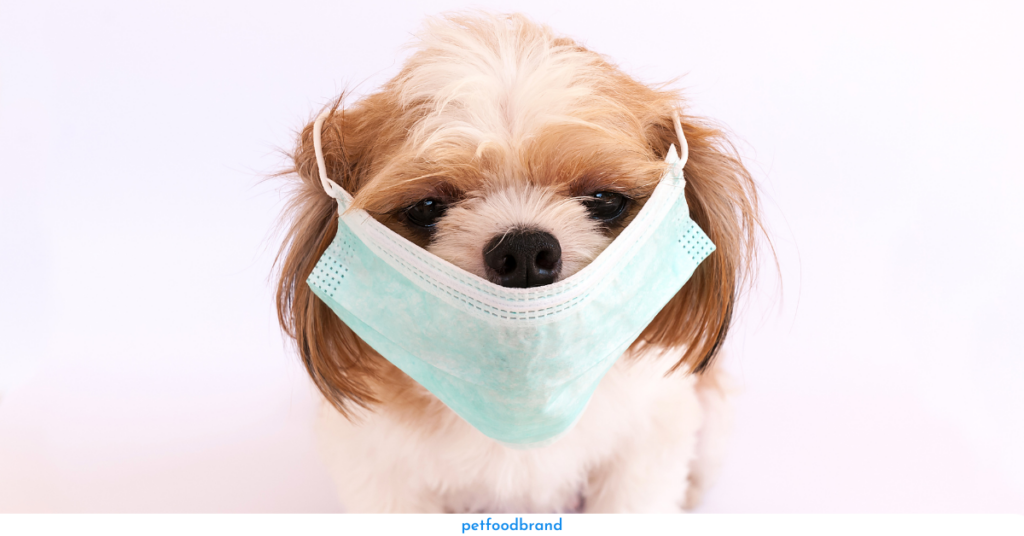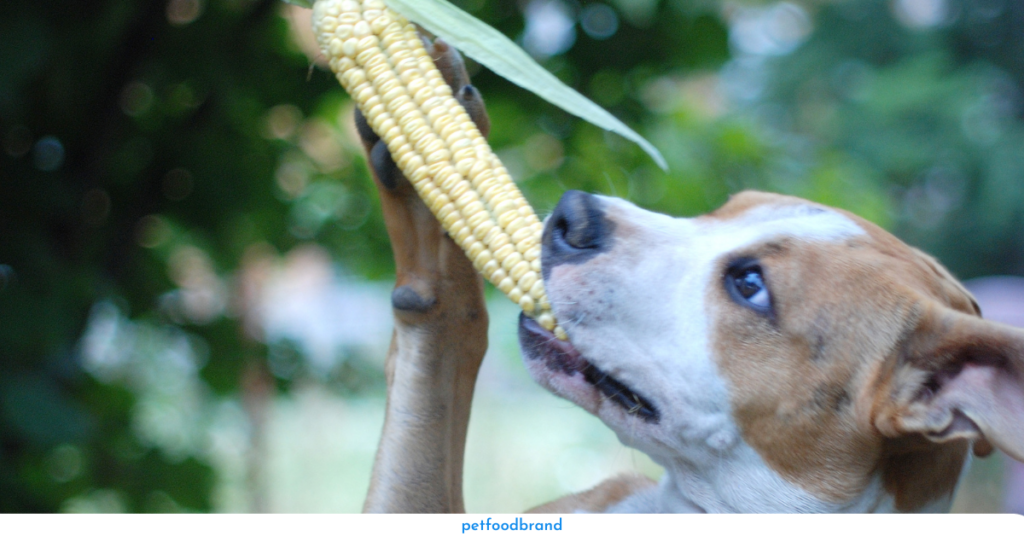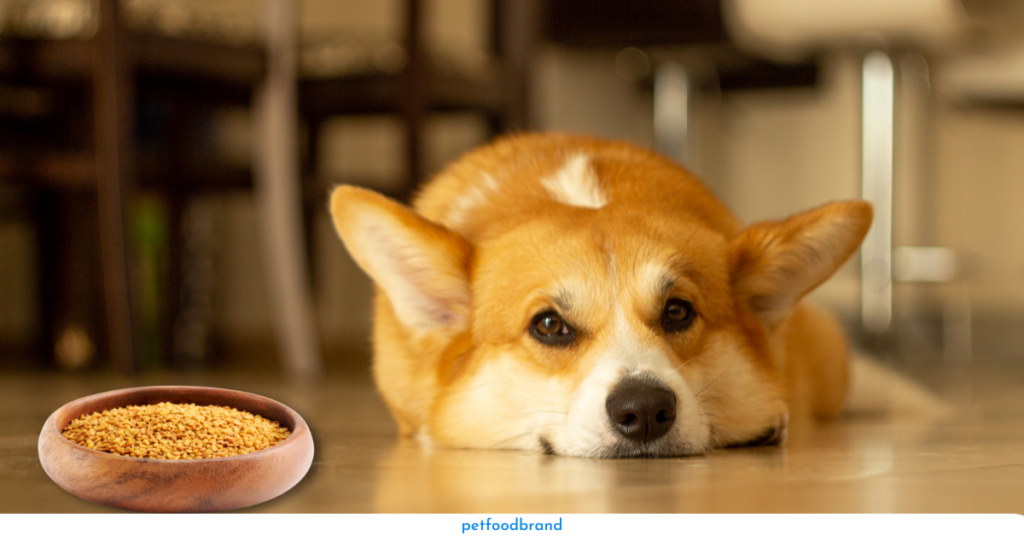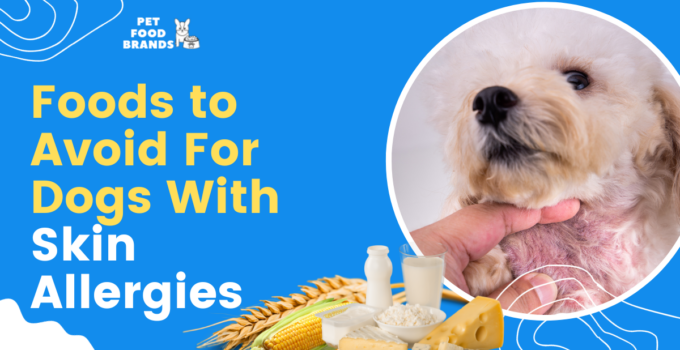If you think having a dog is challenging, you don’t even know what’s coming if you have a dog with skin allergies. Well, I’m not trying to scare you but just preparing you well so that you can take good care of your fur baby.
Skin allergies are quite common in dogs and can impact their overall health and quality of life. But the first thing you must consider if your dog has a skin allergy is diet. Why? Because your pup with a skin allergy cannot eat everything.
Are you wondering what you can and can’t offer your dog? Are you looking for a list of foods you should avoid in case of skin allergies? You’re in the right place.
Dive right in and learn more about the food you shouldn’t give a pup with skin allergies and why!
Skin Allergies in Dogs: All You Need to Know

Skin allergies, also called allergic dermatitis, are dogs’ most common type of allergy. These can be caused by three different things: fleas, food, and the environment.
While flea allergy dermatitis could be an allergic reaction to flea bites or even flea saliva, it can cause your dog’s skin to become inflamed, red, or scabbed because it will feel itchy. It can be easy to treat as you can apply medication to your dog’s skin and help it heal.
The second cause is skin allergy arising from food. Much like we humans – who can be allergic to specific foods, your dog can also be allergic to certain foods. This usually leads to itchy skin. If your dog has food allergies, it could lead to itchy paws or ears and sometimes even cause gastrointestinal issues.
The last is the environmental allergen, which could also impact your pup’s skin and cause allergic dermatitis. Dust, fungus, pollen, and mold can lead to skin allergies, but these reactions tend to be seasonal and affect the skin, mostly paws and ears.
Which 7 Foods Should You Avoid Giving Dogs With Skin Allergies?
When I found out my dog has skin allergies, it took me a lot of time and effort to figure out which foods are okay and which trigger an allergic reaction. I can save you the hassle by sharing the list of foods I keep away from my pup, and so can you.
Below is the list of 7 food products that you should keep away from your dog to prevent it from encountering a skin allergy.
1. Food Additives

The one thing you must always avoid giving your pet is food additives. If you’re wondering why, it’s because they can cause allergic reactions in dogs. Your healthy pooch might suddenly suffer from an adverse reaction after consuming them.
Common food additive allergies can be caused by preservatives like BHT, BHA, propylene glycol (PG), monosodium glutamate (MSG), sodium nitrate, and flavor enhancers.
You might think that BHA is primarily used in cosmetics. But it is a preservative whose main function is keeping the quality of a product intact and increasing its shelf life. Some regions have approved the use of BHA as an additive in pet food.
And the same is true for MSG, which is also a preservative. If your pup consumes large doses of MSG, it can lead to nausea, vomiting, and burning sensations, among other side effects. Dogs that have existing allergy issues can face more severe symptoms.
2. Byproducts
Byproducts are part of many dog food brands, and they tend to contain any part of animals that doesn’t fall under the meat category. It can include horns, hooves, skin, hair, and even feathers. Manufacturers use them to make gelatin for pet food and treats.
If you’re wondering why byproducts are not suitable for a dog with skin allergy, it’s because they contain allergenic proteins that can trigger reactions. A dog allergic to chicken or turkey can suffer the same reactions as when eating real meat.
3. Corn

While you might love corn, it is among the most common dog allergens. Dogs with skin allergies can have a severe reaction to foods that contain corn, and even the ones without an allergy can experience side effects from ingesting it.
Therefore, it is best to avoid giving your pup corn-based products such as sweeteners or cereals if they have skin allergies.
4. Dairy
A lot of adult dogs tend to have problems while digesting lactose. This situation is more like an intolerance and not an allergy. If your dog has lactose intolerance, it could lead to symptoms like flatulence, vomiting, and even diarrhea.
Dairy allergy can cause the same symptoms, making it tough to know if your dog has an allergy or just a slight intolerance. How do you differentiate between the two? Well, there is an important distinction you cannot miss – a dairy allergy can show up as skin itchiness. In contrast, lactose intolerance will always be about digestion.
All dairy products, like milk, butter, yogurt, and cheese, can lead to different allergic symptoms in your pup. These include skin itchiness, irritation, and even inflammation. Since dairy has a lot of fat, it can also lead to digestive issues.
If you notice these symptoms, you must avoid giving your little furry friend dairy products.
5. Wheat

You might come across numerous misconceptions surrounding carbohydrate-containing foods like grains and offering them to dogs. Although more dogs indeed have allergies to meat than grains, wheat allergy is still quite prevalent among dogs.
Besides ensuring the recipes you’re getting for your pup don’t contain wheat, you must consult a vet or pet nutritionist about grains in your dog food.
6. Animal Protein
Now that you know that proteins are among the common food allergens, you can assume how protein-rich foods like beef, chicken, and eggs will affect your pup.
Beef is a common ingredient in many dog foods, which could also be why it’s a known food allergen. The same applies to chicken as well. Just because chicken is so popular for dogs doesn’t mean that canines can’t have an allergy to this protein.
Manufacturers moved to lamb as a substitute since many dogs were allergic to beef and chicken. However, it could also lead to an allergic reaction and must be avoided.
Some dogs can also experience an allergic reaction to eggs. An egg allergy could arise if your pup’s immune system starts overreacting to the protein in the egg yolk. You can easily avoid eggs by double-checking the food labels.
7. Soy

Soy is not only an allergen for dogs, but it can cause health concerns that go way beyond allergies. It can include your pup’s reproductive health, growth, thyroid, and even liver.
Many experts believe that the health risks posed by soy far exceed its benefits, so you must avoid giving it to your pet dog.
Frequently Asked Questions
What Can I Feed A Dog With Skin Allergies?
You can give simple foods with basic ingredients free from grains, gluten, and preservatives to your dog with skin allergies.
What Is The Biggest Food Allergy For Dogs?
The biggest and most common food allergy in dogs is protein, caused by allergens like chicken, beef, lamb, and even eggs.
Is Rice Good For Dogs With Allergies?
If a dog is allergic to grains, you should avoid adding rice to their daily diet.
Final Thoughts
Skin allergies are quite common and noticeable in dogs, and if you think your pet is suffering from them, you have to be extra careful with their diet. Once you remove common allergens from their diet, it will improve their overall health and keep them happy.
With proper care, preventive measures, a proper diet, and strict supervision from your end, your pup can fight their skin allergies and live their best life!

Ankita is a passionate pet lover and head of content at Pet Food Brands. With her extensive knowledge and research, she provides pet owners with top-quality information on dog food and nutrition. Her dedication to improving the lives of dogs makes her a leading voice in the industry.




